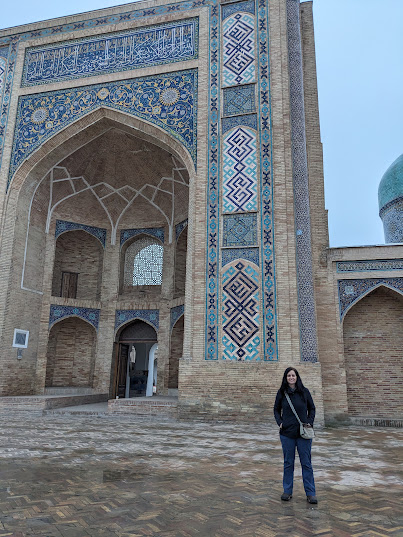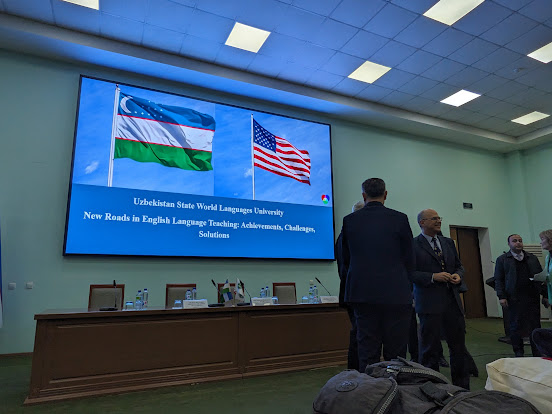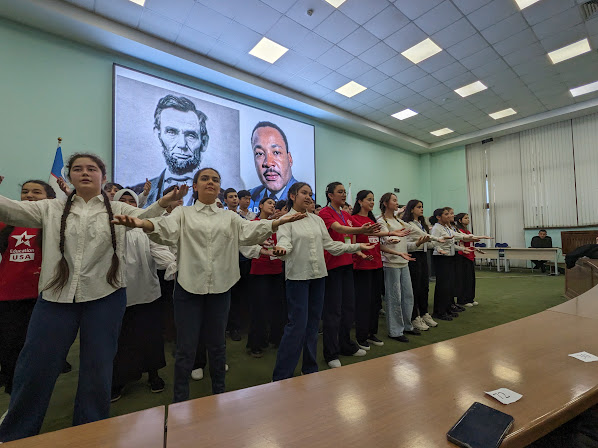A few months ago it was announced that the mid-year conference for all the English Language Fellows in the South Central Asia region would be held in Tashkent, Uzbekistan. I was hopeful that I would get my Indian visa on time to be able to go because I have always wanted to see the 'Stan countries. Luckily, I arrived in India two weeks before the conference. I needed to get from my city of Vadodara to New Delhi to catch a flight to Tashkent. Unfortunately, that morning I got a message saying the flight had been cancelled due to heavy fog in New Delhi. I was eventually rerouted through Mumbai and then got stuck in the Mumbai airport. I watched as mobs formed to shout and chant at airline workers every time another flight was delayed or cancelled. Since all the airplanes were grounded in New Delhi, they couldn't be sent on to other cities, so air travel in the whole country was affected. Finally, at around 4 in the morning the flight took off. This was the view of the wing as we landed in New Delhi:
I had already missed my flight to Uzbekistan and the next one wasn't until the next day so I got a hotel near the airport and booked a new flight to Tashkent. That night I was watching the local news and there was a segment about all the stranded passengers and an airline worker that was assaulted in the Mumbai airport. I didn't see the assault, but I wasn't surprised after seeing how angry the people were. The next day the fog had mostly cleared and I got to travel on a new airline to a new country!
I got to learn airline safety while also learning about Uzbek culture. No smoking on the flight or the ghosts of the Silk Road emperors will come to haunt you and put out your cigarette!
It was interesting to watch the route the plane took over the Western Himalayas. We flew over northern India, Pakistan, Afghanistan, and Tajikistan before touching down in Tashkent.
The view was incredible over the mountains.
Every time I hear the name of the country I am reminded of this interview with Herman Cain, a presidential candidate back in 2012:
A lot has changed in Uzbekistan since then. They got a new president in 2016 and were named 'Country of the Year' by The Economist in 2019. The people are eager to learn English and develop their tourism sector, and the U.S. is supporting those goals by placing English Fellows all over the country.
We stayed at the Radisson hotel for our conference. The Fellows all came together from Uzbekistan, Kazakhstan, Tajikistan, Kyrgyzstan, Nepal, India (only me), Sri Lanka, and Bangladesh. It was fun to see the other teachers that I hadn't seen since our training in Washington D.C. last August. Back then, we formed WhatsApp groups to keep in contact and be able to commiserate when we struggled with adapting to our assignments. It was nice to finally spend time together in person and learn from each other.
In the evenings we were able to go out and explore the city. I wasn't really prepared for the cold, so I brought every jacket I had packed with me to India (mostly rain jackets for monsoon season). I just tried to enjoy it because India is already starting to get hot and humid after a mild winter.
There were some cool buildings in the old part of town. The actual site is hundreds of years old, but much of the buildings have been restored at various times because Tashkent is prone to earthquakes that tend to knock down a lot of the brick structures. Apparently the oldest Koran in the world is here, but we didn't make it there until after closing time. This was a REALLY BIG DOOR.
One of the evenings we went to a cultural center to participate in some activities. We got to meet a music master who played the Sato for us. His grandfather was part of a movement to reintroduce the making and playing of this instrument, and he passed the tradition down to his son and grandson.
It was beautiful to hear.
We also had a chef come and teach us how to make the national dish of Plov, which is meat, rice, and vegetables cooked slowly in lamb fat over a fire.
I'd like to think I was helping, but there is a specific way to stir it to keep the greasy fat on the bottom, the layer of vegetables and meat in the middle, and the rice on top.
I did my best not to ruin it and in the end it turned out to be delicious. I also loved the pastries stuffed with meat and potatoes.
Another famous food in Tashkent is the bread. Each baker has their own stamp to brand their bread with their design. I learned that the way they ferment the yeast means the bread can last months without spoiling. People will travel to Tashkent, buy bread, then take it back to their village and steam a piece of it to make it soft again.
Tashkent is one of the few cities in the region that has a metro system. It was built in the Soviet era, and some of the stations were built to look more like palaces than a metro stop.
After our three-day Fellows conference we then had another two-day conference which was sponsored by the English language teachers in the country and held at the Uzbekistan State World Languages University. We were all asked to present and attend the presentations of English teachers from around the region. For a lot of them, it was their first time presenting at a conference.
Even the U.S. Ambassador to Uzbekistan was there the first day to open up the conference and meet the teachers. Times like this remind me of how important the role of soft diplomacy is in the region. I believe that peace in the world isn't just about ending conflict, but comes from gaining a better understanding of each other, which takes a lot of time and work.
One of the friends I've made is Sharon who happens to be from Erda, Utah. It was fun to hang out with her this week. She is posted in Tajikistan and it's been interesting to compare the differences in our experiences.
The conference provided lunch for us, and we got to sit and share a plate of Plov with the Uzbek teachers. It was nice to be able to chat with them and find out about the different types of students they were teaching. They all spoke English, too! 😆
On the last night the teenage students in the Access English program put on a show that tied in the history of Uzbekistan with the history of America.
There was a lot of cultural appropriation going on at certain points. And despite the cheesiness of the finale where all the students held hands and sang 'We are the World', it was well done and they had clearly had worked very hard on it.
After the conferences were done I had one day to spare before returning to India. At the recommendation from one of the teachers I booked a one-day tour to the city of Samarkand, the old capital of the Timurid Empire. The train took about 2.5 hours and then a guide and driver picked me up at the station and took me around to all the sites before returning on the evening train back to Tashkent.
There are a lot of REALLY BIG DOORS in Samarkand. In fact, it's famous for them. My neck was sore by the end of the day from staring up at the intricate tiles.
Even when you went inside the door, the beauty didn't stop there. It reminded me of the Alhambra in Spain, on the other end of the Islamic architectural world.
This is the tomb of Emir Timur, also known as Tamerlane or Tamer Beg. A descendant of Genghis Khan, in the late 1300s he went on a conquering spree all over the region. He made it from the southern part of Russia down to the northern part of India, from the western edge of China over to the shores of the Mediterranean Sea. He brought back riches from all across Asia to build his own mausoleum and is considered to be the father of Uzbekistan.
His grandson is also buried here, the great astronomer Ulugh Beg, who wasn't quite as fierce a leader as his grandfather. He was a thinker. He brought scholars from all around the Islamic empire to teach math and science at his big madrasa, or school. It was built on Registan Square in Samarkand and has a lot of REALLY BIG DOORS.
The students who studied here would receive scholarships to come and study for two years. These were their dorm rooms - much nicer than mine when I was in college.
I couldn't stop staring at the tilework. It was amazing.
At some point someone introduced the color green into the tiles. Not a door, but a REALLY BIG WINDOW.
Like Tashkent, Samarkand is prone to earthquakes that like to knock things down. This is a picture from the 1930s of people trying to straighten out one of the pillars.
As you stand in that same spot today and look up at it, it's still a little crooked. I definitely wouldn't want to be standing under it when a big earthquake hits.
It's interesting to note that while these scholars were Muslim and used Arabic as the language of science, many of the strict religious clerics of the day did not always approve of their emphasis on scientific knowledge rather than on faith.
These REALLY BIG DOORS were all squished together at the mausoleum of a cousin of the prophet Mohammed.
It was hard to tell the difference between a madrasa (school), a mosque, and a mausoleum. Luckily I had a good tour guide to let me know which sites were which. Oddly enough, when he asked me where I was from and I said Utah, he immediately asked if I was LDS. He said when he was in high school he was a foreign exchange student with an LDS family in Maryland. He is atheist, but he told me about going to church with the family and seeing the Washington D.C. temple.
Of course, you can't visit a main hub on the Silk Road without seeing some silk carpets. Nowadays most of the rugs are made in factories with synthetic silk. The real ones (and even the synthetic ones) were way outside my price range and hard to stuff in a carry-on bag.
We then went to another part of town where Ulugh Beg built his astronomical observatory. Here he made a lot of the discoveries that propelled scientific knowledge about the universe between the eras of Ptolemy and Tycho Brahe.
Ulugh Beg didn't have a telescope but he built his sextant big enough to able to measure the most accurate length of one year that anyone had ever calculated before.
I kept thinking about how I don't really appreciate how much of our world is built on the knowledge of others. I sit and type on a computer, but I don't really know how it works on the inside. We have a lot of information about science that came from those before us that I often take for granted. The guide and I both wondered what Ulugh Beg would have thought about the flat-earther movement today.
The last stop on the tour was the mosque and mausoleum of Emir Timur's wife (well, at least his favorite one), Bibi Khanom. This one is now the poster child for the debate on how to best preserve the old buildings of Samarkand. The guide told me when he was a child he used to play among the ruins of this mosque. This picture shows the different stages of restoration.
Unsurprisingly, it also had some REALLY BIG DOORS.
I enjoyed my time in Uzbeki-beki-beki-beki-stan-stan and hope I will get to see more of it someday!








































1 comment:
Very fun! I loved learning more about Uzbekistan. Nate says we need to take a trek through the 'Stans sometime.
Post a Comment